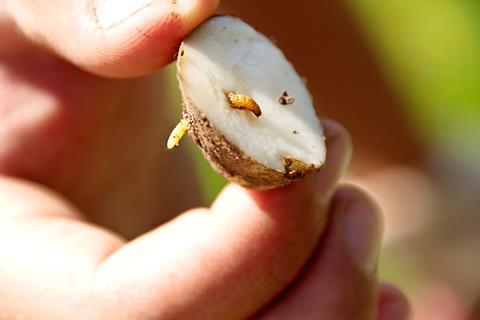Potato, carrot, salad and onion growers can join the next stage of the Enigma I project

Findings from Fera Science’s research project ‘Enigma I – Wireworm IPM’ are now driving a second crucial phase of collaborative research.
As climate change creates more hospitable conditions for wireworm, agri-food organisations with a commercial interest in protecting affected crops – such as potatoes, maize, carrots, salad and onions – are being invited to join the next stage of this project as co-funding partners.
Adam Bedford, Enigma collaborative projects director at Fera Science, explained that new partners will join multinational businesses already committed to the second phase of industry research.
“Building on three years of partner-led R&D, new participants will have exclusive access to our Enigma I findings so far, which have filled longstanding gaps in knowledge on wireworm lifecycles and damage patterns, and helped model the risk the pest poses in future,” he said
“Our second phase of wireworm research is focused on understanding wireworm at a local level, equipping partners with tailored guidance on sustainable wireworm control to help minimise crop losses.”
Risk assessment
With support from Fera scientists, each project partner will obtain a bespoke risk assessment based on crop type, rotation, location and other risk factors, alongside a suite of recommendations to help reduce wireworm populations.
Dr Larissa Collins, lead scientist on the Enigma I project and entomology programme manager at Fera, added: “Leveraging key outcomes of our wireworm research so far, we’ll be working on producing a replicable model that partners can use to help identify the potential wireworm risk and tailor control methods across different growing sites, as part of an integrated pest management strategy.
“The results of this project come at a crucial time for the industry with reports of the pest continuing to increase across the country.”
Collins added that the upcoming research will include further analysis of cover cropping and other non-chemical control methods for the pest – such as beneficial predator insects – shaped by the needs of growers involved in Enigma I from the start.
Bedford said that partners will gain actionable insights through every step of the R&D project.
Further information and the opportunity to register for the project is available here.



